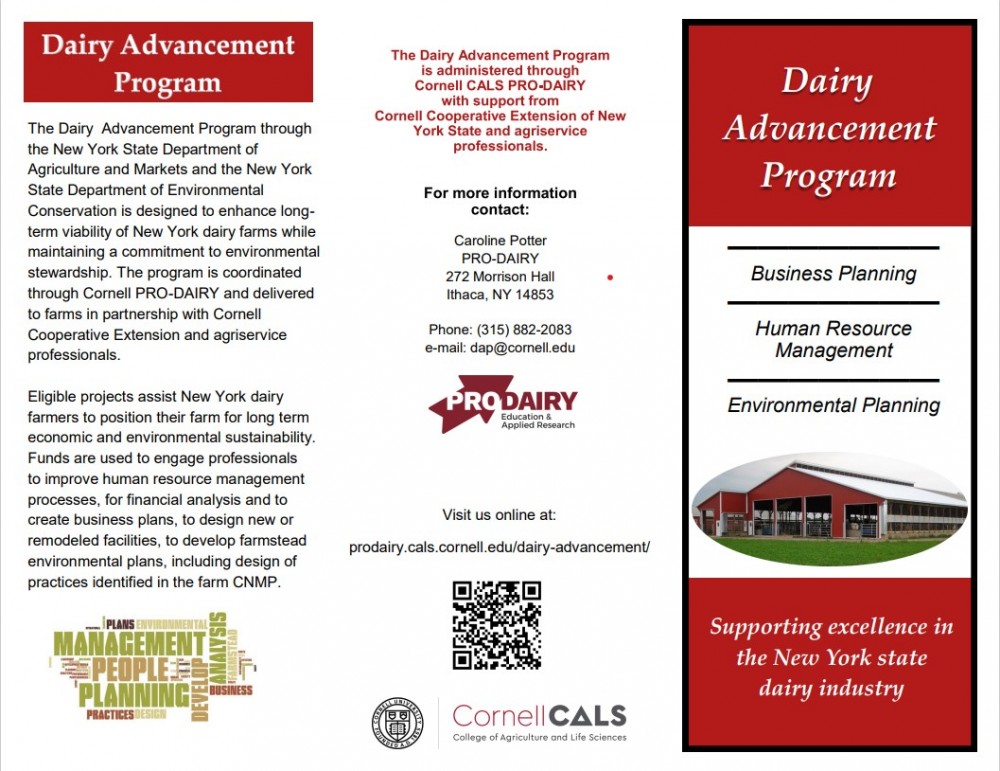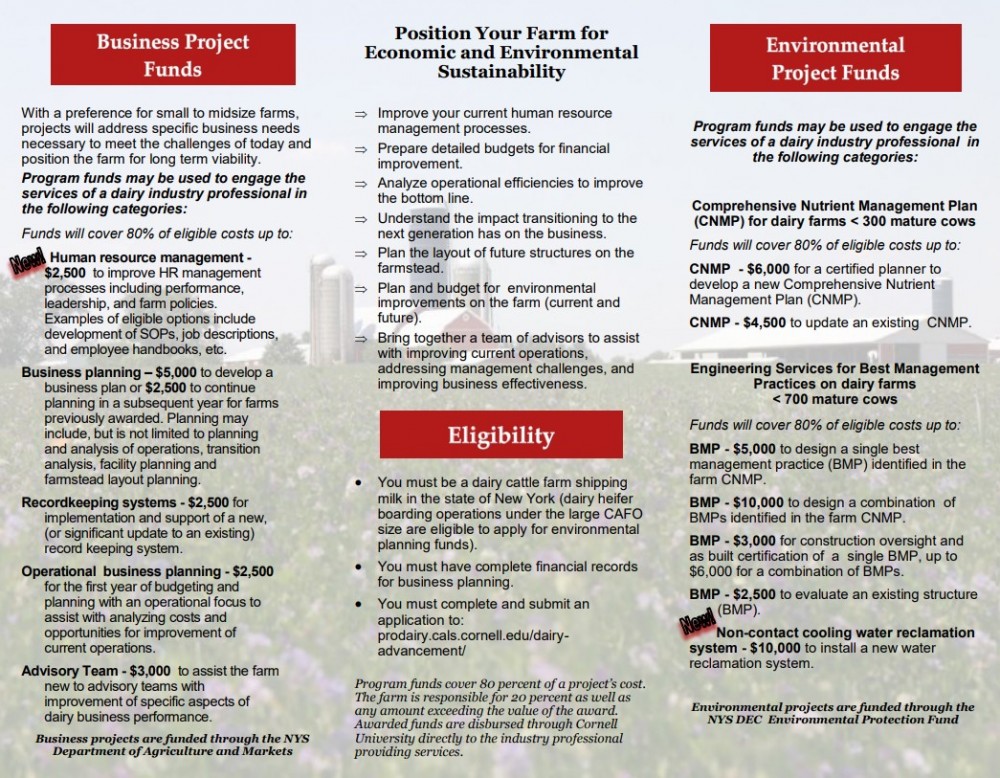A Farm Advisory Team Can Help You Succeed
A Farm Advisory Team Can Help You Succeed
Chris Zoller, Extension Educator, Agriculture and Natural Resources, Tuscarawas County, Ohio State University Extension
Managing all the complexities of a dairy farm is no easy task. Weather, animal nutrition and health, crop variety selection, managing people, and monitoring financial performance are just a few of the items that add to the complexity. Fortunately, there are several people available as a team of advisors to help you address the challenges and contribute to your success.
Farm Advisory Team
You likely are meeting and working with many of the potential team members already, just on an individual basis. Your veterinarian, nutritionist, agronomist, lender, attorney, and Extension Educator are a few of these people. Each brings their own set of knowledge, skills, and experience to the table to analyze, diagnose, and provide recommendations to address challenges and the direction of your farm.
Initial Planning
Before assembling your advisory team, develop a list of questions, issues, or concerns you want assistance and guidance from your team members. Divide the list into immediate, short-term (less than one year), medium-term (one to five years), and long-term (greater than five years) goals or issues you wish to address.
If you've never done it before, completing a Strengths, Weaknesses, Opportunities, and Threats (SWOT) Analysis of your farm business may be beneficial. This analysis can help guide discussion and direction.
This is also a time to consider who would be a good person to be the facilitator of the team. A good facilitator supports the use of teams, is a good listener, can work with groups, and is well organized. The role of the facilitator is to guide discussion, keep the team focused on their task, and communicate accomplishments and expectations. The facilitator may also assist with periodic check-ins to monitor progress.
Getting Started
Forming the advisory team is not difficult. Again, you are already working in some capacity with each potential team member. The goal here is to bring all the members together at the same time.
After you have developed your list of goals and completed your SWOT Analysis, now it's time to invite team members. A phone call or personal visit with each member is suggested. This allows you to discuss your reason(s) for inviting them, what you hope to accomplish, gauge their level of interest, discuss time commitment, and identify potential meeting dates and times. A call or face-to-face visit with the person who you identify as the facilitator is important. This person is key to the success of the team and needs to understand their role and expectations.
First Meeting
A written agenda is strongly encouraged. This helps everyone see the task at hand and keeps the team focused and on track.
Begin the first meeting with an introduction of members, including their role. While most may think they have a good understanding, a brief overview of your farm operation gets everyone on the same page. Describe farm size, cow numbers, animal housing, etc.
Following introductions, share with the team your SWOT Analysis and the concerns you've identified previously. Allow members to review, digest, and react to these. The beauty of an advisory team is that each member will approach an issue from a different perspective and provide possible solutions that others might not have otherwise considered. Remember…two heads are better than one. The facilitator will take notes and lead much of the discussion among members.
Wrapping Up
As the established ending time approaches, the facilitator needs to summarize the discussion, reference notes they have taken, and identify next steps. The next steps include the date, time, and location for the future meetings and tasks to complete (along with the person responsible). These should be sent to all team members. Depending upon the complexity and number of topics you wish to address with the team, the frequency of meetings may vary. I believe you should meet with your advisory team at least once a year.
Summary
Farm advisory teams can bring together those with diverse knowledge and skills all focused on your long-term success. Devote time to completing a SWOT Analysis, developing your goals and areas of concern, and invite team members to join you.
If you have questions about advisory teams, I encourage you to consult the resources listed below. Your local Extension Educator is a great resource to help you navigate the process.
Sources
An Advisory Team Approach to Your Farm Management, ResearchGate, https://www.researchgate.net/publication/273124170_An_Advisory_Team_Approach_to_Your_Farm_Management
Conducting a SWOT Analysis of Your Agricultural Business, Ohio State University Extension, https://ohioline.osu.edu/factsheet/anr-42
Dairy Advisory Teams Tools for Facilitators, Penn State University Extension, https://extension.psu.edu/dairy-advisory-team-tools-for-facilitators
What are Dairy Advisory Teams? Penn State University Extension, https://extension.psu.edu/what-are-dairy-advisory-teams
___________________________________________________________________________________________________________________________________________________________________________________________________
DAP Funding is available for Advisory teams! This is a reminder that there is still Dairy Advancement Program Funding available to assist the farm's new advisory teams with improving specific aspects of dairy business performance. You can apply for up to $ 3,000.
In addition to advisory teams, DAP has funds available to improve recordkeeping (Quickbooks, DairyComp, etc.); go through the Business Planning process to prepare for succession, expansion, or changes; or develop and implement comprehensive nutrient management plans. DAP is funded by NYSDAM and NYSDEC. You can contact Katelyn Walley-Stoll or Camila Lage in Southwest New York to apply or learn more. DAP funds cover 80% of the cost of the project up to $2,500 - $10,000, depending on the project.
If you want to learn more about how to put together an advisory team or more information on DAP funds, please feel free to call or email Camila Lage at 607-422-6788 or cd546@cornell.edu


Upcoming Events
Crops, Cows & Critters - Southwest New York Dairy, Livestock & Field Crops Newsletter Sponsorship
December 19, 2025
Our two forms of publications feature research-based and timely information from our four specialists, listed to the right, along with local event notifications and Cornell University outreach. This information is provided to participants who range from dairy, livestock, and field crops producers to agricultural suppliers and consultants.
Weekly Email Update: Shared with 625+ households who have signed up with our program.
Monthly Paper Mailer: To reach our stakeholders and farmers who lack internet access, we send out a monthly mailer where your company's logo and contact information would be featured with a mailing list of 330+ households.
If you sponsor our weekly and monthly publications you reach approximately 955 households.
Visit our website to view our newsletters!
2025 Cornell Food Beverage & Animal Feed Manufacturer Survey
December 19, 2025
Industry and Educational Advocates for New York State's Food, Beverage, and Animal Feed Manufacturing industries:
As you know, NYS has a diverse food and beverage manufacturing industry, in both the types of industries that exist and the wide distribution of firms by scale. Many manufacturing firms have strong backward linkages to agricultural production sectors in the state that support both farm-level and downstream food industry firms and consumers. In collaboration with the New York State Department of Agriculture and Markets, a team from Cornell University's Charles H. Dyson School of Applied Economics and Management has recently rolled out the 2025 New York State Food, Beverage, and Animal Feed Manufacturer Survey. The industry will benefit from an updated assessment of the industry that informs private and public investments and opportunities to support firm growth and improved profitability.
Cornell Organic Field Crops & Dairy Conference
March 6, 2026
Waterloo, NY
Farmers, researchers, educators, and agricultural service providers from across the Northeast are invited to the 2026 Cornell Organic Field Crops & Dairy Conference, held Friday, March 6, 2026, from 8:00 a.m. to 4:30 p.m. at the Lux Hotel & Conference Center in Waterloo, N.Y.
Co-hosted by New York Soil Health and Cornell CALS, the annual conference brings together leaders in organic grain, dairy, and livestock systems to share practical tools, new research, and farmer-tested strategies to support resilient and profitable organic production.
Announcements
No announcements at this time.





